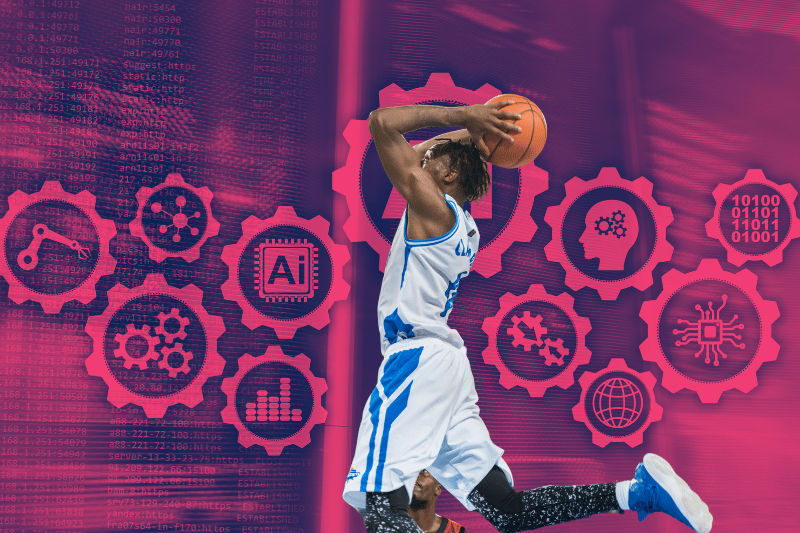
With the adoption of new and innovative technology, the sports industry is rapidly changing. These new technologies have transformed how we perceive, and analyze sports. The culmination of data science, artificial intelligence, and advanced statistical methods has kicked off a new era of sports analytics, revolutionizing the industry where data-driven insights guide every play, decision, and tactic. We’ll explore how the sports industry has changed because of this new concept and the trends that follow along.
Instant Replay: Real-Time Sports Data Analytics for Quicker Decision-Making
Gone are the days when coaches had to wait a long time for analytics from the previous night’s match. With real-time sports data feeds and live data, coaches can perform sports data analytics to make adjustments to the plays if needed and counter the opponent’s strategies readily.
A dynamic playbook with every play can be created by integrating sports data APIs with real-time analytics platforms. This level of integration offers a significant advantage to the coaches and analysts, allowing them to perceive the game rather quickly and make quick and effective adjustments to their strategy. Today, a good coach is not someone who is just an expert at the sport, they should also be an expert at interpreting the data and making necessary and swift decisions based on it.
 Understanding Sports Analytics
Understanding Sports Analytics
Sports analytics consists of applying mathematical and statistical principles to analyze sports data. This can be divided into two main categories: on-field analytics and off-field analytics.
- On-field analytics is directed at enhancing the performance of players by developing and analyzing strategies, fitness levels, and in-game tactics. Teams gain a competitive edge by using data to optimize player decisions.
- Off-field analytics helps sports organizations make informed decisions to improve business processes, drive profitability, and ensure growth. This includes analyzing fan engagement, marketing strategies, and financial performance.
AI and Machine Learning: Transforming Sports Data Analytics
The revolution of sports analytics can only be possible because of artificial intelligence (AI) and machine learning (ML). These technologies have transformed sports data analytics by providing tools for game strategy, player development, and talent scouting. Some of these models powered by AI can predict the players’ performance, and injury likelihood and optimize training programs, changing the way how teams are built. Technologies like cloud computing, IoT, and big data analytics have transformed traditional business models into data-driven systems.
AI is also helping in boosting fan engagement through customized content, interactive experiences, and predictive game analysis. Teams can offer fans customized experiences that were unimaginable a while ago, by using sports data APIs. The future of sports analytics is led by using AI and ML to fuel every aspect of a sport.
Driving Revenue with Sports Data Analytics
With the help of Sports data APIs, personalized marketing campaigns, ticket pricing, and merchandise offers that are targeted towards fans based on their preference and behavior can be provided. This approach would enhance fan engagement by deepening loyalty, thereby driving revenue for sports organizations.
Ethical Considerations and Data Privacy in Sports Analytics
There are a variety of ethical and privacy concerns when it comes to sports data analytics. While more and more data is collected to reach a deeper understanding of the match and other factors, other responsibilities come with the data collection. Strict data governance is necessary to protect sensitive and personal information.
The future of sports analytics can be embraced with technology adoption, continuous learning, and foresight. The future of sports analytics is full of unlocked potential, offering new opportunities that enhance the performance and fan experience.
 Football: Leading the Sports Analytics Revolution
Football: Leading the Sports Analytics Revolution
Football is at the forefront of the sports analytics industry. The demand for sports data analytics for the sport as it’s very popular in European countries, particularly in top leagues such as the UEFA Champions League, Bundesliga, and the Premier League. Data analytics software is used by these leagues to gather insights on player performance, patterns, etc.
As technology continues to grow and shape the sports industry, this market will gain significant growth. The integration of sports data feeds, sports data APIs, and advanced analysis tools will provide so many new opportunities that were unimaginable a few years ago. Embracing these changes and trends could help you stay ahead of the curve.
In conclusion, there is no denying that data analytics has transformed the sports sector, and having access to state-of-the-art technology is necessary to stay competitive. With its rich sports data APIs, Data Sports Group delivers real-time insights and actionable analytics through the seamless integration of AI and machine learning. Data Sports Group gives you the tools to make data-driven decisions that result in success, whether you're a company boosting fan engagement or a coach improving strategy. To take advantage of sports analytics' future and be ahead of the curve in this ever-changing sector, choose Data Sports Group.










